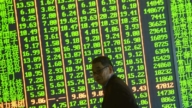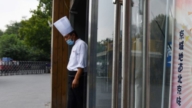【新唐人2014年07月29日訊】「北京大學」日前發佈了一個調查報告,報告顯示,中國頂端1%的家庭擁有全中國三分之一以上的財富,而底層四分之一的家庭,僅擁有全國1%的財富。分析指出,中國貧富兩極分化,社會階層的對立與動盪將越演越烈,中國的經濟已瀕臨崩潰。
7月25號,北京大學中國社會科學調查中心發佈《中國民生發展報告2014》,報告指出,中國貧富兩極分化已十分嚴重。
其中顯示,2012年中國頂端1%的家庭,擁有全國三分之一以上的財產,而底層25%的家庭,擁有的財產總量僅在1%左右,中國家庭淨財產「基尼係數」已達0.73。
「基尼係數」是居民收入分配公平程度的指標,數值在0到1之間,越高顯示公平程度越低。
中國金融智庫研究員鞏勝利:「我看了這個報告,我覺得這個核心就是中國社會在加劇分化,窮人更窮,富人更有錢。它說了一些中共從來沒有說過的大實話,這種實話是用數據把它表現出來的。」
旅美中國社會問題研究人士張健:「25%的老百姓加在一起,卻占有了全中國的財富的1%,就證明了中國有更多貧困的人,他們生活在貧困線之下,這些人不單是沒有溫飽、沒有人權、沒有被尊重的權利、同時這些人也是中國在所謂改革開放以來,最大的受害者,他們貢獻了所有的一切,但是他們得到的只是苟延殘喘。」
這個報告還顯示,有家庭成員在體制內工作的家庭財產水平,明顯高於在體制外工作的家庭,而在體制內工作的家庭財產的增長幅度,也明顯高於體制外家庭。
張健:「這樣一個政府執政,它不按憲法辦事、它不按市場經濟規律辦事、中國的經濟必然就走入到今天這樣一個模式當中,越來越多的權貴形成了利益集團,他們掌控了所有國家資源、掌控了人民的言論與生殺大權,而且他們不單純是將今天的中國經濟搞垮了,我們未來的,比如說空氣、土地、所有的礦產,這些資源也會被中國的特權們瓜分乾淨、摧毀乾淨。」
中國金融智庫研究員鞏勝利指出,中國貧富兩極分化很容易引起社會階層對立,從而導致社會動盪。
鞏勝利:「在這個報告下,我做了一個數據的統計和分析,中國目前,他說的佔1%的家庭,在中國可能有5千萬到8千萬人,而中國最貧窮的那些人大概有5億,這兩個數字一對比,你就知道,它的矛盾以及激化點和衝突點。」
時事評論員龔平在博文中指出,中國最頂端家庭往往擁有巨大的隱形財富,如何估計他們的真實財富,是一個棘手的問題。他認為,「北大」的數據存在嚴重低估的傾向。
今年4月,美國「密西根大學」發佈的研究報告顯示,從1980年到2010年間,中國的「基尼係數」幾乎擴大了一倍,中國的貧富懸殊水平已躍升全球第一位。
張健:「政治體制改革死亡的時候,中國幾千年奠基下來的文化和中國所有的財富都會被中共的特權在一夕之間毀於一旦,經濟、政治和百姓的生活、民生是密不可分的。有這樣的體制,就會出現現在的情況,這是非常正常的,而且這種情況將持續蔓延不斷惡化,直到中共倒臺的那一天為止。」
草根經濟博主王海濱也對《自由亞洲電臺》指出,中國的分配不公歸根到底還是體制問題,在這個體制下,貧富差距只會進一步擴大,中國的經濟發展已經走向盡頭。
採訪/朱智善 編輯/陳潔 後製/李勇
Peking University: One Percent of Households Own 1/3 of China’s Wealth
A recent report from Peking University, issued their findings
of its survey, stating,
the top one percent of Chinese families, has more than one-third
of China’s wealth,
with the bottom 25 percent of families having only one percent
of assets in the entire country.
Analyses points out, the severe disparity between the two,
is likely to enhance any social unrest and class opposition.
Is China’s economy on the verge of collapse ?
July 25, China Social Science Research Center
of Peking University,
issued its China Family Panel Studies result of 2014.
It shows severe polarization between the rich
and the poor of China.
The studies show in 2012, the top one percent of Chinese
households, had more than one third of the national wealth,
and the bottom 25 percent of households had only one percent
of national assets.
China’s Gini coefficient has reached 0.73.
Gini coefficient is a gauge of inequality, between zero and one,
the higher the reading the more severe the inequality.
Chinese financial think tank researcher Gong Shengli:
“I read this report. I think the core issue is the increased
differentiation in Chinese society.
The poor have become poorer, whilst the riche
have certainly become richer.
It speaks of one great truth which the CCP has failed to mention.
The truth is manifested with in the data."
China’s social problems researcher Zhang Jian:
“25 percent of the population takes one percent of China’s wealth,
it proves that China has more poor people.
They live below the poverty line, have no food and clothing,
no human rights, no rights to be respected; they are the biggest
victims in China since the so-called reform and opening up.
They have contributed everything only in exchange of
just lingering on."
The surveys also show families with members working within
the system, have significantly higher assets than those
working outside the system.
Likewise, the growth of assets is also higher for
within-the-system families than outside-the-system families.
Zhang Jian: “China’s economy is surely falling into such a
way, that the regime ignores the Constitution and follows
no market economy and law.
Many more elite groups are controlling the national sources.
They control public opinion and the life and death of the people.
They have not just ruined China’s economy. They have also
deprived the air, the land, the resources from us
and destroyed them completely."
Gong Shengli indicates the extreme inequality will easily cause
social class opposition, which subsequently leads to social unrest.
Gong Shengli: “Based on this report, I did a statistical analysis
of the data.
There are about 50 to 80 million Chinese, accounting for
one percent of households,whereas there are about 500 million Chinese
under the poverty line. These figures truly reflect the huge contradictions within China’s system, and why such intense conflict and
divide exists."
Commentator Gong Ping indicated in his blog, that the very rich
Chinese households tend to own stealth wealth
which is hard to estimate.
He believes these surveys are seriously underestimating
the true wealth.
In April this year, a research paper from University of Michigan
showed China’s Gini coefficient, had nearly doubled
between 1980 and 2012.
“Income inequality in today’s China is among the highest
in the world."
According to University of Michigan sociologist Yu Xie.
Zhang Jian: “When the political reform in China finally dies,
the thousands of years of culture and wealth in China,
will die with it.
The livelihood is inseparable from the economy and the politics.
This regime has made it this way and the situation will only
continue to worsen until the downfall of the Communist regime."
Grassroots economy blogger Wang Haibin told Radio Free Asia,
that the fundamental issue in China’s inequality exists
within the system.
Under the current Communist regime, the inequality will only
expand further as the economic development in China
has come to an end.
Interview/Zhu Zhishan Edit/ChenJie Post-Production/LiYong




























